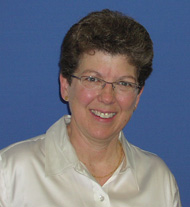 UNMC researcher Carol Ann Casey, Ph.D., answers questions about her work, life and interests.
UNMC researcher Carol Ann Casey, Ph.D., answers questions about her work, life and interests.
NOTE: This profile is part of a series highlighting the 25 researchers who were named UNMC Distinguished Scientists for 2006. Each of these researchers will be profiled in UNMC Today leading up to a March 12 ceremony to recognize their achievements.
Q: Describe your research in 25 words or less.
A: In our laboratory we are examining the mechanisms responsible for, and medical consequences of alcoholic liver injury. We also hope to develop potential therapies for treatment.
Q: How did you decide to pursue this area of research?
A: I had done my graduate and postgraduate work in the area of liver metabolism, but those studies were involved with nitrogen metabolism in fish. When I finished my postdoctoral research, and was looking for a job, I saw an ad in Science magazine for an opening at UNMC in the liver study unit with Drs. Tuma and Sorrell to look at alcohol-induced liver injury and applied for the job.
Q: When did you realize you were interested in research?
A: I always liked science and math but never really got interested in research per se until I was in graduate school. I initially thought I would teach in a small, liberal arts college, and that was my motivation to get my Ph.D.
Q: What are the greatest challenges in research today?
A:Keeping funded so we can work on our projects! Also, there is so much new information that it is hard to keep abreast of the literature to best design experiments to answer questions.
Q: Best advice for new researchers?
A: Be active in your laboratory and your unit, keep abreast of new information by reading the literature and talk to your colleagues and friends. Collaborations are great, and having someone to bounce your ideas off of is a great way to look at your results and design your experiments. Find a good mentor that you can talk to and that you respect.
Q: When an experiment stalls, what drives you to continue on?
A: It’s kind of like a detective game — because when experiments don’t work, or don’t seem to progress, there is probably some reason — you just have to try to figure out what it is. Additionally, you might want to back up and see if you are taking the right approach. So — research is never boring — and there will always be that quest for the answer.
Q: Who has been your greatest teacher?
A: Probably my parents who taught me to work hard, but enjoy life. I also have been blessed with some great role models in my professors and colleagues from college years through the present. We have a great group at work and I feel like I am learning new things every day.
Q: Tell us about your family and hobbies outside the lab.
A: I am married to Rich Meyer, a chemist, who is currently an assistant professor of chemistry at Midland Lutheran College in Fremont. We have three really wonderful boys who make sure our life is never dull! Jonathan is 18, and a freshman in college (University of St. Thomas in St. Paul, Minn.); Josh is 16 and a junior at Creighton Prep High School and Joe is a seventh grader at St. Margaret Mary. They have been very active in sports and school activities over the years, and so that has kept me busy too. Rich and I have been very involved in Cub Scouts and helping at school activities. My personal hobbies outside of work would be reading (I’m in a book group), walking for exercise and I love to travel.
Q: Globally, describe the most notable research achievement ever?
A: Probably the discovery of the DNA molecule.
Q: Clarify a common misconception about research?
A: That it is boring and that you work by yourself. I used to think researchers were tied to a lab bench all day, but it really is a profession where your analytical skills, but also interpersonal skills, are developed.
Q: What would you tell a student interested in a research career?
A: I would encourage them to try to get an internship or undergraduate research experience (like the Student Undergraduate Research Program that is available at UNMC). I think there are people who might think that they would be interested, but it might not be so appealing to them once they get into the lab. Alternatively, I have seen students who really get turned on to research through these activities — and that is neat to see. I think that whatever you do for your career, you want it to be something you enjoy, so an opportunity to try it out is great. It’s difficult for many of us researchers to encourage a strict research career to students just because of the difficulty of maintaining funding these days, but we should not discourage students who really love the idea of working on a problem in the laboratory.
List three things few people know about you.
- I graduated from eighth grade from a one-room country school. At one point there were 11 of us in the whole school and six were Caseys.
- I was extremely shy until I was in high school — I had to force myself to greet customers at our melon stand when they came in to buy produce.
- My favorite TV show is ‘Wheel of Fortune’ and I watch it whenever I can, and would love to be on the show someday!